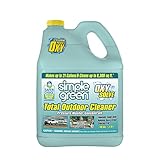Best Vinyl Siding Cleaners
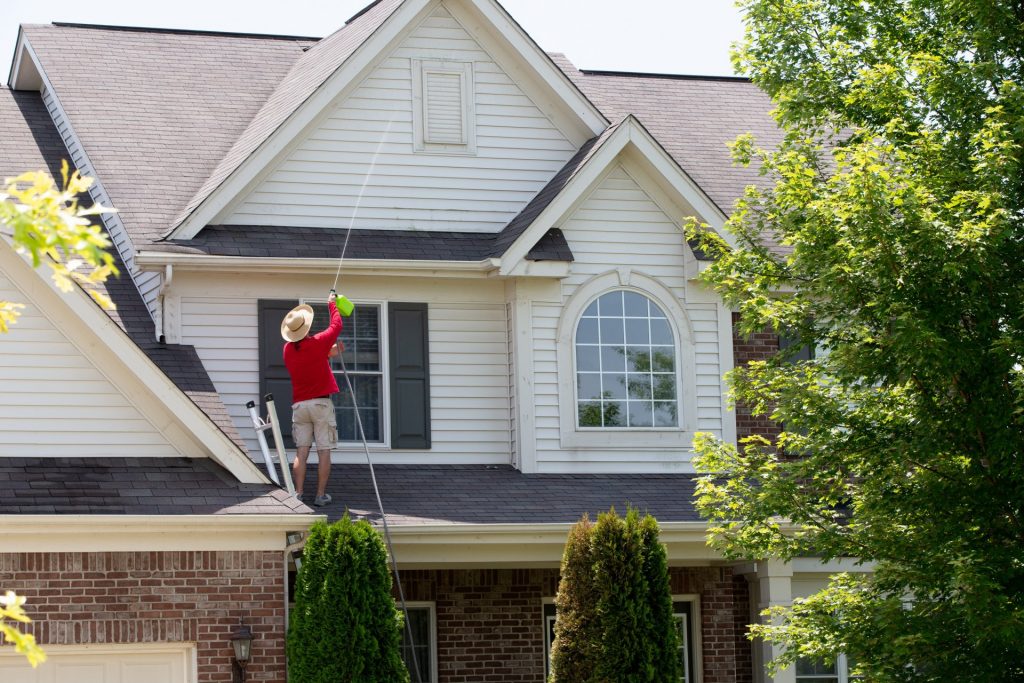
You feel a special pride when you return home after a hard day’s work and a park in front of a beautiful house with the most beautiful sidewalk in the area. A well maintained garden and a good selection of flowers are of course important elements in the overall impression of your home.
However, there is an indispensable part of the equation – more hygiene. Keeping your house clean can be time consuming and expensive, but it is not necessary if you have a pressure washer (or if you rent one). Combined with Best Pressure Vinyl Siding Cleaner for Scrubber, it makes your siding as good as new, easier and faster than ever.
When it’s time to do your routine work outdoors, be sure to look for a good product that you can use. That’s why we prepared the Vinyl Siding Cleaner reviews of our favourite products on the market.
What is a Vinyl Siding Cleaner?
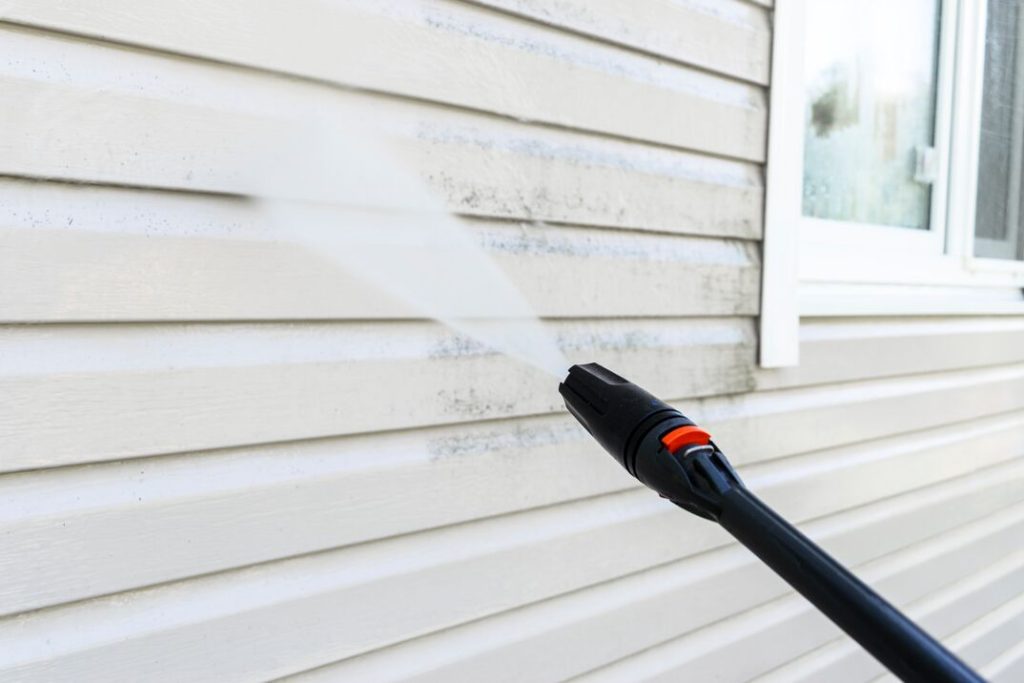
To keep your home impeccable from the inside out, do not sand. Aluminium, vinyl, wood, concrete and stone are building materials that can be washed freely under pressure.
When it is time to remove the coating, you should not only use a ready-to-use multifunctional cleaner:
- Some of the general cleaning products are too weak and therefore can’t help you get rid of mould, lichens, sap, insects and bird droppings, mud, rain stains and other outdoor hazards that usually tarnish the beauty of vinyl coverings.
- On the other hand, if you use a multi-purpose cleaner that is too strong or contains the wrong ingredient, you may get a clean, but discolored and damaged home carpet.
- After all, not all products can be used with a high-pressure cleaner. Some simply can’t produce dirt if they explode at 1500 PSI, while others can even damage parts of your pressure washer.
Fortunately, many companies and brands are aware of this. That is why they decided to formulate specific products for pressure washing vinyl covering to keep it clean and beautiful without damaging it.
For your convenience, they are manufactured and packaged in many forms. You can buy a small 22-pound spray bottle to remove stains, or even a 2.5-gallon can with concentrated product that can be reused in your high-pressure cleaner.
Top 5 Best Vinyl Siding Cleaners
Vinyl Siding Cleaners in UK
Wet & Forget - Moss Mould Lichen & Algae Remover (5 Litre)
£26.80
If you have a large garden, it is advisable to use a product that can clean many outdoor surfaces. From stone piers, concrete paths to vinyl coverings, wet and forgotten mold and an algae tracker, everything is manageable.
This soap is non-caustic, non-acidic and bleach-free. It is designed to combat the natural accumulation of mould, mildew, moss, lichens and algae. It is suitable for almost all surfaces, not only for the rigid building materials of the house.
However, we do not recommend using this product indoors as it contains benzalconium chloride. Because this active ingredient is a powerful biocide – it cleans all moss and fungi – you should wear safety goggles and a face mask when spraying on the pavement.
Star brite Mold Stain & Mildew Stain Remover + Cleaner - High-Alkaline, Triple-Action Formula Works Instantly
If you are fighting mould and other natural enemies to reduce your attraction, we recommend Star Brite Mildew & Stain Remover as an extra product for difficult areas. However, this product is NOT designed for foaming high-pressure cleaners. This is because it is a robust pot formula that is resistant to mould and dirt. The solution contains bleach, surfactants and alkali, combined in a very alkaline solution, ready to fight the strongest points.
If you are looking for a single product that can replace all the extra special soaps for your entire home, Simple Green Pro HD Intensive Cleaner is the solution for you. This concentrated formula can treat all types of grease and dirt without damaging the delicate vinyl material.
This product has been developed to cut grease and dirt evenly. You can use it anywhere in and around your home, with kitchen worktops, your car and the railways in your home. This formula is non-corrosive and does not destroy plastics, making it one of the most versatile products on the market.
This time we offer you their special product for cleaning the walls of the Simple Green Oxy Solve. This solution is designed to be used on a variety of surfaces including vinyl, aluminium, gypsum, wood and brick. A 1-gallon bottle contains up to 21 gallons of diluted product. This soap is intended for high-pressure cleaning.
If you are concerned about the environment, we recommend that you use this product because no aggressive chemicals are used. Instead, Simple Green Oxy Solve uses the cleaning power of peroxide to remove dirt, foam and mould from many building materials. In fact, this product is certified as Safe Choice because it meets US-EPA standards for safety products.
If you really can’t resist, we have a cleaner for you. Scotts Outdoor Cleaner is the most affordable product on the market for one pound. Although the price is normal and quite familiar, this product comes in a bottle twice the size of a normal vinyl upholstery cleaner. Scotts Cleaner comes in a 2.5 gallon bottle with the ability to prepare up to 25 gallons of ready-to-use solution that can be sprayed by a high-pressure cleaner. However, if that’s not enough for your needs, you can opt for a smaller set with a 32-ounce bottle with a built-in hose adapter and a 32-ounce spray bottle, both ready for use without dilution.
The Ultimate Guide to Selecting the Vinyl Siding Cleaners
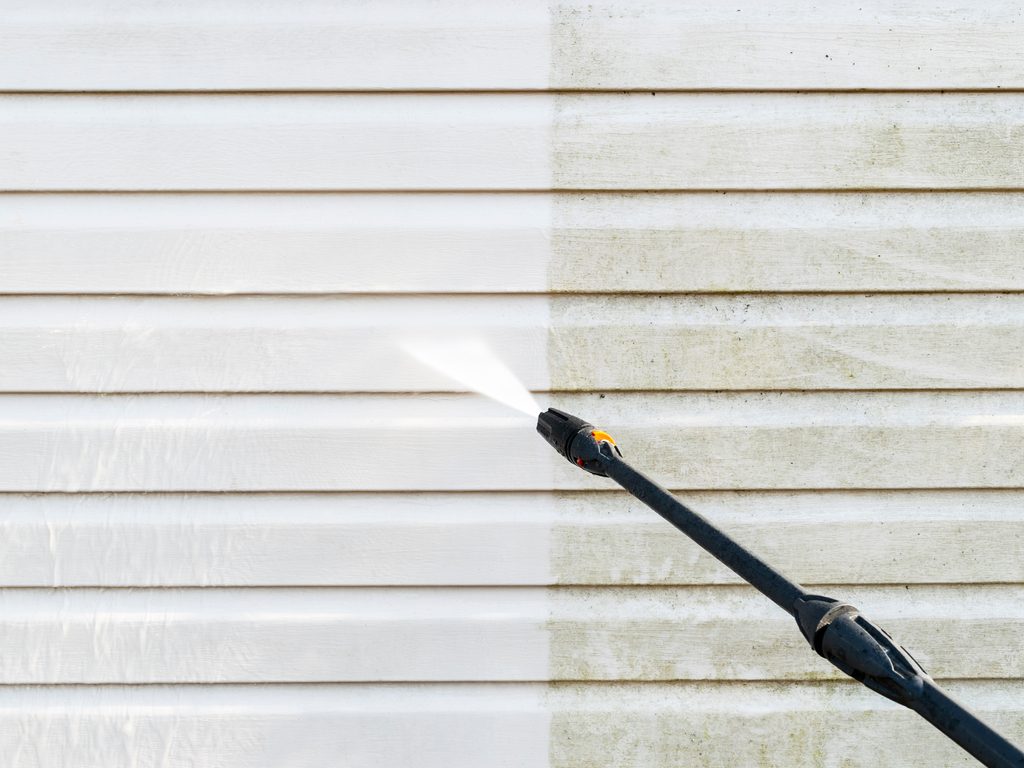
It is very difficult to choose the right cleaner for vinyl upholstery. When you try to find your way in the market, you may feel overwhelmed by the large number of products available, which do not differ much from each other. That’s why we decided to make this buying guide. Here we discuss the most important factors to consider before making your final choice of vinyl floor cleaning products in high pressure machines.
1. List of ingredients
Ingredients are the most important factor to consider, but unfortunately also the most difficult to understand and control. Here are some general tips to help you make your choice.
Always use products based on inorganic solvents such as water and hydrogen peroxide or soaps containing surfactants such as alkyl sulphates. The emphasis here is on inorganic and water-soluble ingredients, as these are unlikely to cause a bad reaction with the vinyl material.
Bleaching agents
If you are dealing with mold outdoors, you can choose a number of products containing ammonium chloride, bleach and oxygen bleach. They are very good at getting rid of nasty mushrooms.
However, please note that bleaching under pressure can damage your systems and your sealing ring, especially the pump seals, making it necessary to replace the sealing ring under pump pressure. However, you can use a spray bottle for bleaching, which is sprayed directly onto the problem area.
2. Concentrated or pre-diluted formula
As with automotive and household cleaners, there are two types of cleaners in the vinyl coating cleaning industry: concentrated or ready-to-use cleaners.
The concentrated product must be diluted with water before use and the rate of dilution depends in many cases on the seriousness of the dirt to be cleaned. In fact, this means that for each gallon of concentrated product there is between 3 and 10 gallons of soap. This makes concentrated products more economical and they can serve you for a long time. However, it also means that it takes time and effort to dilute the product. Usually this type of product is supplied in bottles of half a litre or more.
3. Packaging type
The type of packaging depends mainly on the formula of your product.
Concentrated formulations are generally sold in large vials with a capacity of 0.5 to 5 gallons. You can also find smaller bottles of concentrated products that are easier to handle. Concentrated products are usually supplied with a bottle cap that measures one pound or other quantity, so that the correct dilution ratio can easily be determined.
Pre-diluted formulas are usually supplied in containers ready for use in a finished form. In practice, this means either a spray bottle or a bottle with an adapter for your garden hose or a high-pressure cleaning hose. They are generally easier to use, but they also contain less product and are slightly more expensive.
4. Gardening and sustainability
After rinsing, the cleaner should stop somewhere. Usually this means that the ground around your house or through the gutters is moved until it eventually ends up in a river, lake or sea. In any case, you want the impact on nature to be as small as possible.
Whether it’s protecting garden plants or protecting fish and other aquatic animals, you need to look for an environmentally friendly option. They are generally labelled as non-toxic, biodegradable or EPA Safer Choice. All this ensures that the appeal of your home has no impact on the environment.
5. Odour
And if you have trouble decorating your house, you can make it smell good too. There are many products that are suitable for pressure washing vinyl upholstery, so you can also take into account the fragrances you may or may not like. What smells good and what smells bad of course only depends on your personal preferences.
Method of application for Vinyl Siding Cleaner
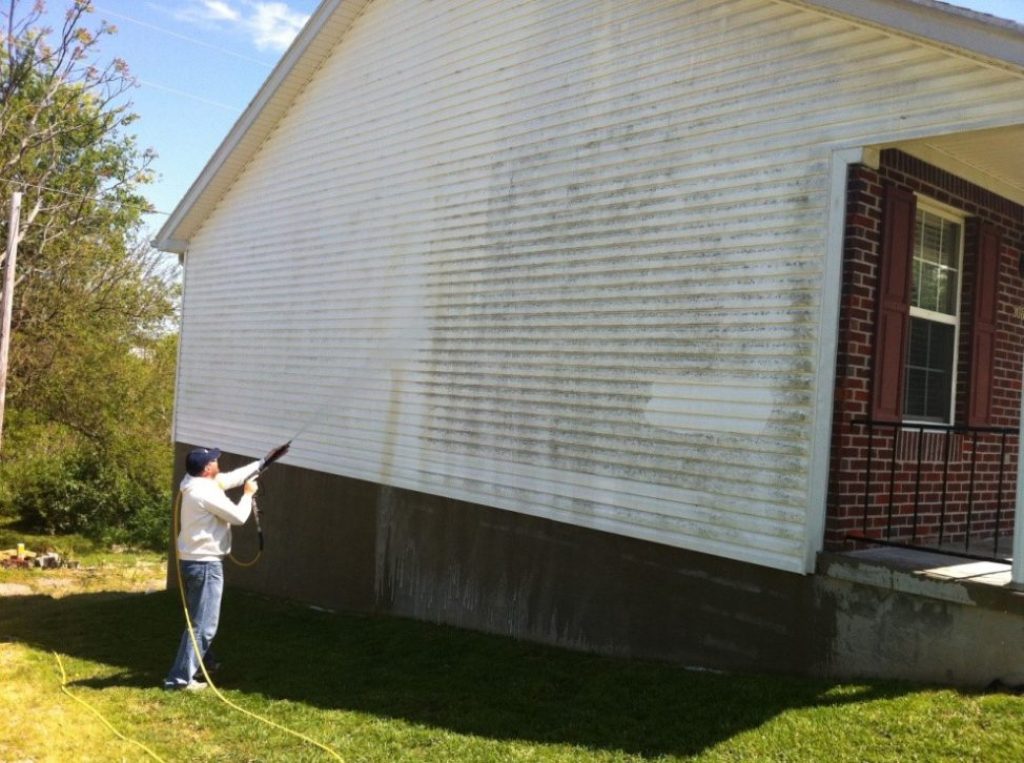
There are several ways to apply Vinyl Tape Cleaner. This of course depends mainly on the type of product you choose. The most common application methods for cleaning vinyl coverings are a built-in applicator, a bucket and a medium soft bristle brush or spraying with a high-pressure cleaner.
Of course, nothing prevents you from trying different applications of your product – just make sure you don’t put any products into the machine that are not intended for your high-pressure cleaner. You may even have to clean manually if you come across a very bad stain or mold.
1. Integrated candidate
As with the multifunctional soap, some vinyl upholstery cleaners have a built-in applicator. This is usually a spray bottle or adapter that connects the bottle to your garden hose or high-pressure cleaning rod.
If you plan to use the product with a dishwasher adapter, make sure the container is designed for the power of the dishwasher. If not, the adapter may burst. Not only will you lose the money you’ve spent on the product, but it can also spill onto your garden and you could suffer serious injuries, including chemical burns to your skin, respiratory tract or eyes. Make sure the product is designed for high-pressure cleaning before attempting to connect it.
2. Manual application
If you do not have a foam spray tip (usually black) or foam gun tip for your electric pressure washer, you may need to soap your coating by hand. The work can be long and difficult, so you have to find the right tools for the job. We recommend that you buy a medium sized soft brush with a long handle and a reliable bucket for your product.
However, if you wash under pressure, but a particularly strong stain needs to be removed, you can remove it by hand, giving you more control and strength. Fortunately, no separate product is required – most vinyl pressure washers for washing machines can also be applied manually.
3. Pressure cleaning
High-pressure cleaning is the quickest and easiest cleaning method. This is due to the fact that most of the tasks that traditionally required multiple lubrications have been replaced by a high-pressure water stream. However, you must ensure that the product you choose is suitable for use with high-pressure cleaners. Not all formulations can produce good dirt if they explode under high pressure, and some products (such as bleach) can even damage the inside of your high-pressure cleaner.
If you encounter a stain that is resistant to the water jet, you may need to apply it manually with a brush. However, an even more effective and simple way to remove stubborn stains is to use high-pressure wash brushes, which combine the power of pressure water and bristles for impeccable cleaning.
How to use a pressure washer for cleaning vinyl side panels?
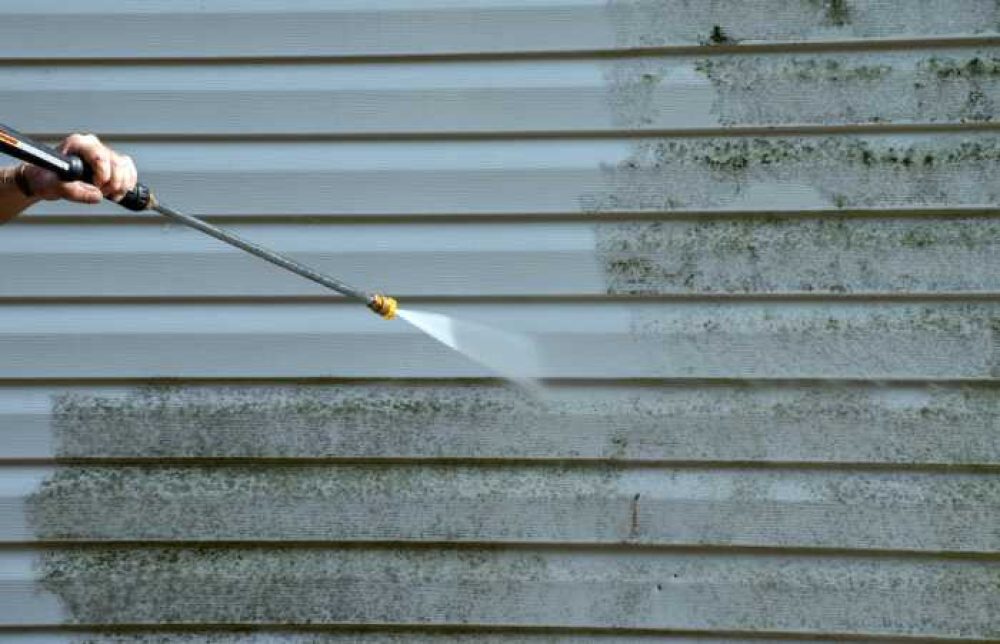
Never before have you been so quick and easy on the outside of your house. If you know exactly what to do, you don’t have to worry about the end result. With the right procedure, you can achieve this ultimate curtailment of vocation time and again.
Here is our basic guide to washing your vinyl covering with a pressure washer. Here we give you an overview of the entire process of washing the facade cladding. Feel free to experiment and share tips and tricks with us and other readers in the comments section below!
Total Time: 5 minutes
Equipment required
You don’t need many different devices to wash your house with a pressure washer. However, there are tools you need and extra equipment that make your job easier.
– Pressure washer
– Pressure wash points: 25 degrees (green) or 40 degrees (white) and a black foaming nozzle (or a hand brush for soaping)
– Detergent for vinyl coveringsAdditional tools :
– Wax extension for obtaining high pressure
– Brush with high-pressure cleaner for cleaning hard-to-reach areasFor more information about high pressure cleaners and their accessories, please visit our website.
Before commencement
Here are some general principles of what you should pay attention to and some tasks you should perform before you can start the actual laundry.
Preparation at home
The first thing you have to do is choose a clear, mild day with little wind to wash your house. If the sun is too strong, it can dry out your soap before rinsing, which can be an obstacle. High winds can cause unexpected problems that can affect the water flow and the fall of the dirty sludge. Ideally, you should work in spring or early summer.
You have to know that water and electricity don’t go well together. Make sure you unplug all open sockets outside your home. You should also cover your lamp and other electrical appliances with plastic foil and tape. Also take care not to use the gasket to relieve pressure near power lines or outdoors.
Move or cover your garden furniture. You don’t want him to get wet or get in the way. Also make sure your doors and windows are closed before you start spraying – you don’t want your interior walls or carpets to get wet.
Make sure that there are no damaged areas where the wooden or vinyl parts cannot withstand the strong pressure wave of the pressure washer. Fix them, or avoid them once you’ve started.
Grass preparation
If certain plants or shrubs lean against your sideline, you may need to prune them. It is not only best not to spray the plants with soap, but also to locate heavily polluted areas. The reason for this is that the parts of the coating that are covered with plants often show the worst forms and moulds in addition to the green discoloration of the leaves.
Take your garden hose or pressure washer with you and let the bushes, plants and grass soak before washing your house. This way you can ensure that the soap does not stick to the plants. Instead, you can easily wash any soap that comes into contact with your plants.
Personal safety
You must also make sure that you and your family are not harmed in any way by washing with lateral pressure. First of all, make sure everyone in the house knows that you are going to use the washing machine when you clean the house. This way, no one makes simple mistakes such as opening a window or approaching the explosion zone where the air is full of soapy chemicals.
Always use safety goggles when working with detergents and soaps. As soon as your pressurized water hits the wall, it recoils and turns against you. Eye protection ensures that your most sensitive organ remains intact when exposed to aggressive cleaning agents. We recommend wearing a respirator and hearing protection, as well as waterproof boots and clothing.
NEVER STAND ON THE STAIRS WHEN YOU’RE WASHING YOURSELF UNDER PRESSURE. If you have a two-storey house, this may seem inevitable, but instead of climbing the stairs, you can use a telescopic rod.
Setting
As soon as you have taken care of your personal safety and prepared your house and lawn, you can get to work.
And now it’s time to put on your petrol pressure washer. Connect the water supply hose and connect the electric high-pressure cleaner or fill the gas model with fuel. Add vinyl upholstery cleaner – via a siphon hose or in a separate detergent container in the pressure washer.
Set your PSI between 1200 and 1600. That’s enough for all the work.
Prepare the nozzles. For the first step – applying soap – you need a black foam tip, a pressure cleaning brush or a normal brush with medium, soft bristles. Once the soap is washed, you will need either a green tip of 25 degrees or a white tip of 40 degrees for good rinsing. With the green you have a smaller water fan and more pressure, while with the white you can wash larger areas more easily, but with less pressure for each stain. We therefore recommend that you use both and adapt them to the area you are working on.
Soap application
You must first soap your house. Use a low-pressure black foam nozzle, foam gun, high-pressure cleaner or a regular hand brush to apply vinyl upholstery cleaner to walls.
Apply the soap from bottom to top. If you’re used to washing your car, this may seem counterintuitive, but there’s an important reason to change your order when you’re dealing with an area the size of your home. Because if you let the dirt dry out, it causes ugly stripes. So always work from bottom to top, even if this means flushing or reworking the underside of the floor.To make it easier, don’t try to soap the whole wall at once, but work action by action. They don’t want the soap to dry to wash itself. However, you should not rinse it immediately. After soaping, leave the area for 5 to 10 minutes (or according to the soap manufacturer’s instructions) before washing.
If you find a particularly dirty spot, you may need to clean it with a medium sized soft brush, either by hand or with a pressure brush. Don’t worry, you can use the same soap for high-pressure cleaning and manual cleaning.
Coils
Finally, it’s time to wash the soap and do it before it dries!
To perform this task you need a 25 degree green or 40 degree white nozzle. Use white lace with a wider angle if it does not need to be washed, but only needs to be washed with soap. If an area needs a higher pressure, use a green dot that produces a more concentrated power.
When rinsing, the nozzle of your industrial pressure washer should be about one foot from the surface. Spray directly on her if you can. Never spray under horizontal sidewalls. Instead, you should wash yourself by spraying from one side to the other, one plate at a time. Never spray directly on the windows.
When rinsing, go in the opposite direction to the soap application. That means you have to wash your area from top to bottom. After all, you don’t want to get dirty in areas that are already clean, but you may have to wash the lower parts again, especially if a lot of dirt has come into your house from above.
When you’re done, just let your house dry naturally and you’ll have the most beautiful house in the area!
Tools:
- High-pressure cleaner
- Pressure wash points: 25 degrees (green) or 40 degrees (white) and a black foaming nozzle (or a hand brush for soaping)
- Cleaning agent for vinyl coverings
- Wax extension for obtaining high pressure
- Brush with high-pressure cleaner for cleaning hard-to-reach areas
FAQ
Can I make my own solution for cleaning vinyl upholstery?
You can make your own solution for cleaning vinyl upholstery, but you cannot use it in a dishwasher. Apply the solution with a spray bottle and scrub the problem area with a soft or medium brush. Then rinse with fresh water using a pressure washer under £100.
With the ingredients you have in your kitchen, you can make two solutions. One of these is a vinegar solution that can be used for general soiling, discoloration and light soiling. The advantage of vinegar is that it is completely natural and non-toxic, so it is not harmful to you, your animals or plants. Just mix 1 part vinegar with 3 parts water in the siphon. White vinegar does the trick. Spray the area, leave it for a few minutes, rub and rinse. You can use a little soap while scrubbing, but do not apply the soap until the vinegar has descended.
Another solution you can make at home is a bleaching agent that helps you fight dirt, lichens and moulds. Add 1 liter of bleach to 1 gallon of water and apply directly to the problem area. Bleach is a powerful disinfectant that kills bacteria and fungi. Remember, bleach must be handled with care.
Do not use in a spray bottle or pressure washer. You don’t want bleach sprayed into the air you breathe and especially not near your eyes. In addition, do not use bleach in a high-pressure cleaner as this will damage your pump. Finally, you should not use bleach on coloured vinyl. As with clothing, bleach burns the paint and causes white stains. However, if you have white vinyl upholstery, you can use bleach to restore shine.
How often should I clean vinyl flooring?
There is no right or wrong time to wash vinyl upholstery – if it’s dirty, it’s time to wash it. As a rule, the connections of the pressure line should be washed once a year, or more often if there is a lot of mould or dirt. If the coating still looks clean after a year, you can skip this task and wash the coating under pressure every two years.
What is the best time of the year to use vinyl upholstery for washing machines?
Mild weather, no wind or rain, ideal for high-pressure cleaning. It may seem intuitive to clean bevelsiding in summer, but don’t let the strong sun dry out the soap before rinsing – a recipe for bevelsiding with stripes. The wind, on the other hand, can change the direction of the water droplets, form side bands or even direct the water back into the face. Ideally, vinyl records should be washed on a mild spring day or in early summer, depending on the climate.
Can I use vinyl bleach in my print washer?
I’m not gonna do that. Bleach can easily damage the heart of your pressure washer – the pump. The passage of bleach through a high-pressure cleaner causes the seal of the pump to deteriorate and also significantly reduces the service life of the high-pressure cleaning hose.
However, a bleaching solution should not be used in any form of spray. When, for example, bleach is sprayed with a vaporizer, a mist of bleach forms in the air, which is dangerous to inhale and can damage plants and garden furniture.
If it is absolutely necessary to use bleach, wipe with a brush, soak for a few minutes and rinse the area thoroughly before spraying with a cordless pressure washer.
Which SIP should I use to clean vinyl flooring?
Vinyl cladding is quite elastic, but it is not waterproof and can be damaged by the same force as the water in your pressure washer. Never use more than 1800 PSI on vinyl records, at an average pressure of approximately 1400 PSI, to avoid damaging your liner.
Remember that under no circumstances should windows, doors or loose or damaged parts of the house be sprayed under horizontal side walls or under pressure.
Conclusion
Vinyl is an excellent material for bevelsiding. It is resistant to the weather, to many kinds of parasites and bacteria and simply looks great. But if you want your vinyl flooring to last a lifetime, regular maintenance is the key to success. Fortunately, it’s not as hard to make your house as fresh and beautiful as it once was. In fact, with one of the best high pressure vinyl upholstery cleaners you can take advantage of modern times to get the job done quickly and easily.
We hope you’ve found the answer to all your questions in our purchase guide and in our reviews of vinyl tape cleaners. We have tried to provide you with the most reliable information and the most honest opinion about the products.


